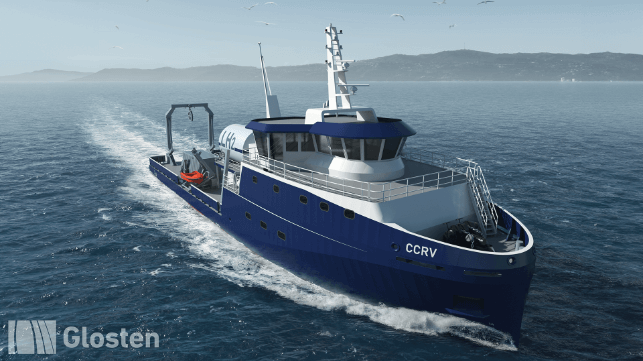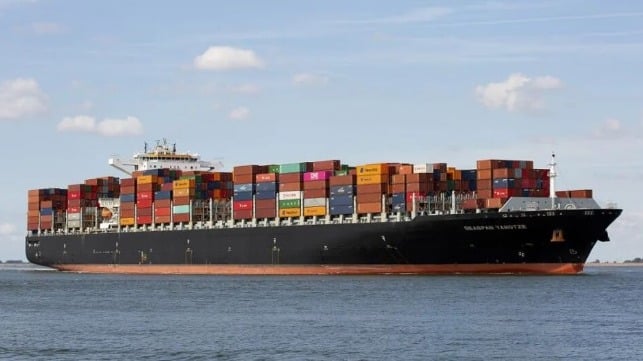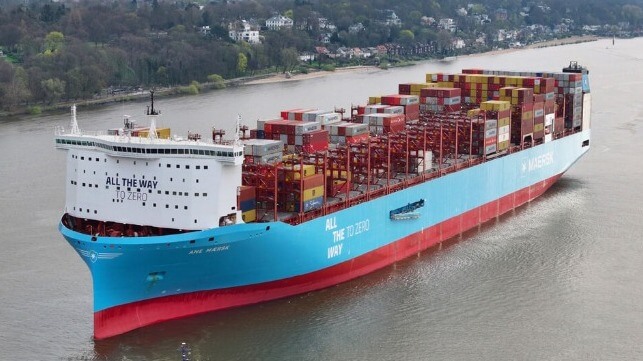ALT. FUEL
World's First Hydrogen-Hybrid Research Vessel Awarded Approval in Principle

[By: Glosten]
Naval architecture and marine engineering firm Glosten has been awarded an Approval in Principle (AIP) by the American Bureau of Shipping (ABS) for the design of UC San Diego’s new hydrogen-hybrid Coastal-Class Research Vessel (CCRV). The CCRV will be operated by Scripps Institution of Oceanography and feature an innovative propulsion system that utilizes hydrogen fuel cells for zero-emissions operation.
Glosten and the project’s electrical integrator, Siemens Energy (SE), completed the preliminary design for the CCRV in March 2024. As an uninspected, California Air Resource Board (CARB)- compliant, ABS-classed vessel and an alternative design under SOLAS, the CCRV faced a complex regulatory regime.
“Our challenge was to harmonize the requirements of a modern research vessel with evolving regulations and novel technologies for liquid hydrogen fuel. Ensuring the machinery spaces and hydrogen systems were efficiently and safely arranged without compromising the utility of the vessel was like putting together an intricate puzzle,” said Glosten’s Robin Madsen, the lead marine engineer on the project.
“When it comes to a first-of-its-kind vessel like the CCRV, these are uncharted waters—it was up to our team to tap into our expertise and work with regulators, partners, subcontractors, and equipment providers to determine a sound approach,” said Madsen. “One of Glosten’s greatest strengths as a consultant is our ability to navigate this kind of uncharted regulatory terrain. It’s the difference between paint-by-numbers and a blank canvas—in one case you know what you’ll be getting, in the other you have the potential for something truly unique.”
In 2018, Glosten, Scripps Oceanography, Sandia National Laboratories, and DNV conducted a feasibility study that became the genesis of the CCRV. The study evaluated the technical, regulatory, and economic feasibility of the Zero-V concept, a vessel powered by fuel cells and liquid hydrogen designed to meet performance and environmental criteria established by Scripps. While the study confirmed that technology had advanced enough to make a hydrogen- powered research vessel possible, regulations around the use of hydrogen fuel are still in development. During the CCRV’s preliminary design, Glosten worked closely with the United States Coast Guard (USCG) and ABS to define a regulatory approval framework for the use of
liquid hydrogen aboard a research vessel.
“ABS is proud to use our industry-leading insight into hydrogen as a marine fuel to support this project. The CCRV has the potential to make a significant contribution to the wider adoption of hydrogen, a promising alternative fuel for the maritime industry,” said Gareth Burton, ABS senior vice president, global engineering.
Prior to submitting the design for AIP, Glosten successfully completed a week-long risk assessment workshop with the USCG, Scripps, SE, and major equipment providers, Ballard Power Systems and Chart Industries.
AIP shows that the CCRV design meets the technical requirements and safety standards of ABS, but more broadly, it validates the use of hydrogen-fuel-cell propulsion for medium-sized coastal vessels. The CCRV will help Scripps and its researchers study the marine ecosystem along the California coast, running entirely on emissions-free hydrogen fuel cells for 75 percent of its missions.
“Our goal is to produce a fully capable ocean-going research vessel that meets the needs of our scientists and students, and demonstrate that this can be done in a way that absolutely minimizes its impact on our environment," said Bruce Appelgate, associate director of Scripps and head of ship operations and marine technical support. “This will be a world-class oceanographic research vessel that aligns with our institutional values for protecting the planet."
The CCRV will also serve as a vital platform for hands-on learning. As a student-centered, research-focused public university, UC San Diego considers seagoing experiences a cornerstone of educational programs. The vessel will be integral to training the next generation of scientists, leaders, and policymakers.
The project team is currently progressing the CCRV to a functional-level design and assisting Scripps with a request for proposal to begin solicitation for construction.
The products and services herein described in this press release are not endorsed by The Maritime Executive.
COSCO Signed to Start Methanol Conversions for Seaspan and Hapag

A contract signing ceremony took place yesterday, June 26, in China for the first five methanol conversions planned for Seaspan’s containership fleet. COSCO Shipping Heavy Industry will undertake the projects starting in 2026 on vessels operating under long-term charters to Hapag-Lloyd.
Seaspan has already contracted with MAN Prime Serv for the conversion of the current S90 diesel engines into methanol dual-fuel engines. MAN has previously said that it is a straightforward process as its standard, electronically-controlled diesel engines are being constructed as dual-fuel ready making them ready for retrofitting. The project launched in 2023 and calls for an initial phase of converting 15 vessels with options for 45 additional conversions.
After the work is completed, the ships will be capable of operating on green methanol. According to MAN, the conversion will be capable of reducing CO2 emissions by 50,000 to 70,000 tons per year.
Each conversion project is expected to take between 80 to 90 days, with the first ship arriving at the yard in the first quarter of 2026. COSCO is valuing the total project at $120 million.
The ships selected for the project were all built in China in 2014 and each is 1,105 feet (337 meters) in length and 115,000 dwt with a capacity of 10,100 TEU. They are operating under a long-term charter from Seaspan to Hapag. The ships are the Seaspan Amazon, Seaspan Ganges, Seaspan Thames, Seaspan Yangtze, and Seaspan Zambezi.
This project will follow the launch next month of the first conversion of an in-service containership. China’s Xinya Shipyard is preparing for the arrival of the Maersk Halifax which is currently on its final trip and due to reach the yard in early July. The shipyard was contracted in 2023 and reports the conversion and repairs on the vessel will last about three months. Built in 2017, the 178,000 dwt containership is anticipated to be the first of 11 vessels that Maersk will convert. The class of 15,000 TEU ships is slated as the first test for refitting older vessels to methanol.
Another Chinese shipyard recently completed outfitting the first of X-Press Feeders containerships that are being built as methanol-ready to instead enter service methanol-capable. X-Press Feeders delivered the ship directly from the builder’s yard before putting it in service highlighting the rapid advances that are being made in methanol technology and the anticipated growth in the supply to fuel these ships.
Maersk to Test Green Methanol Fuel Cells After Breakthrough Demonstration

The startup Blue World Technologies is reporting it achieved a breakthrough by demonstrating the first high-power maritime fuel cell system to run on green methanol. Maersk is an investor in the company and has committed to the first pilot system installation which is expected in 2026.
The company reports it completed the successful tests of a 200 kW high-temperature PEM fuel cell module at its facility in Aalborg, Denmark. The results are reported to have exceeded performance expectations. Blue World reports that the system provides high-grade waste heat of 150 degrees C and when it reaches the commercial stage it will have an efficiency of up to 55 percent which typically provides a fuel savings of 20 to 30 percent.
“This is a major breakthrough within maritime decarbonization and with the test of our 200-kW system, we are proving that the HT PEM fuel cell technology has the potential of being one of the key technologies to decarbonize the hard-to-abate sectors,” said Dennis Naldal Jensen, Chief Technology Officer at Blue World Technologies. “During the test period, we successfully validated our system setup with the methanol fuel processor, the series connection of the fuel cell stacks, as well as the balance of plant components surrounding the fuel cells”
Blue World reports it will initially supply systems for auxiliary power aiming to replace conventional fossil-based gensets. They also report that the fuel cell system allows for up to 100 percent carbon capture providing for the potential utilization in green fuel production or storage. Blue World expects the maritime system will reach a commercial level in 2027.
Eventually, the company will proceed to supply large multi-megawatt propulsion systems for fuel cell-based propulsion systems. They also note that the system is built with a modular approach, allowing for fuel cell power systems as containerized solutions on deck or integrated on the ship.
“Having worked with fuel cell technology for more than 20 years, it is amazing for us to reach this stage of the technology development, where we with these large systems can provide a strong alternative to an industry that is heavily dependent on fossil-based technologies,” said Anders Korsgaard, Chief Executive Officer and Co-founder at Blue World Technologies.
The first pilot will be a 1 MW system for onboard power production. The system will be installed on one of A.P. Moller – Maersk’s large dual fuel-enabled methanol vessels. They expect the installation will take place during the first half of 2026.
Maersk Growth, the venture arm of A.P. Moller – Maersk, participated at the end of 2023 in an €11 million fundraising. The Export and Investment Fund of Denmark (EIFO), Cycle Group, and other new and existing shareholders also participated in the fundraising.
No comments:
Post a Comment